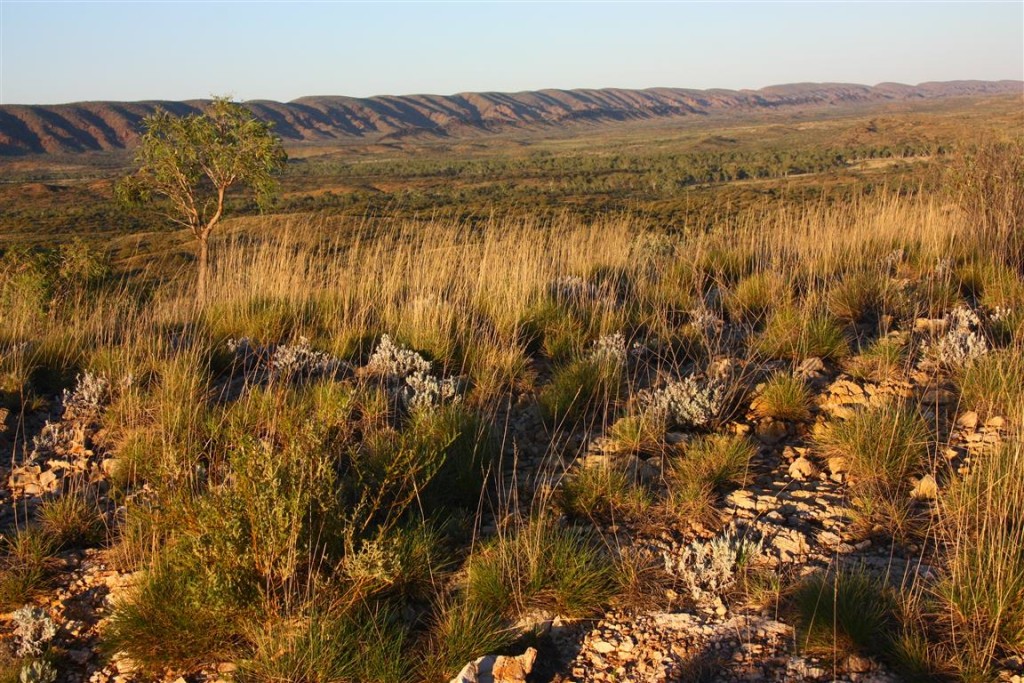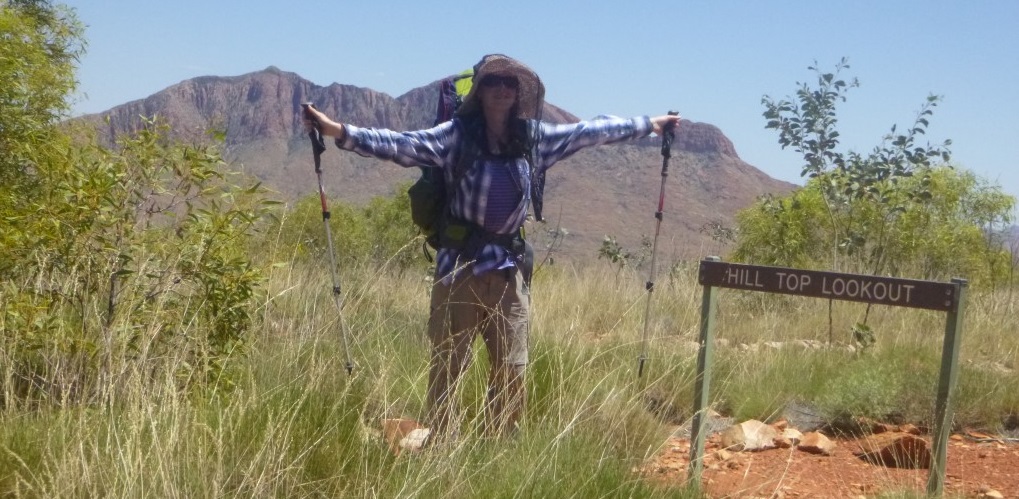You’d have to be crazy to hike in the Australian Outback in the middle of the summer.
And so, there I was, planning a four-day walk through the Western Macdonnell Mountains, hitching to the trailhead, setting up camp in a dry river bed to wait out the hottest part of the day. The Larapinta Trail traverses 223 kilometers (139 miles) of the Western Macs, a crumbling ochre range slumped across the Outback near the town of Alice Springs. Established campsites with water tanks are situated regularly along the trail and ephemeral water holes offer opportunities to swim. But there is little shade, and at this time of year, zero people. Prostrate in the screened section of my tent, sweating through the 41°C (105°F) afternoon, I made it to exactly four o’clock before the second thoughts (sanity) began to creep in. The sun was a malevolent Cyclops, the world a cracked earthen pan alive with the sinister movement of heat. Sunset was still three hours away, dark another two, and although I was twenty feet from a water tank, thirst was a tangible specter. I started to think about what would happen if I got stuck on the trail without water. At this point, however, I no longer had a choice. Crazy got me here, but it was my feet and survival skills that were going to have to get me out.
Darkness fell, finally, at nine, but the earth beneath me radiated with stored heat. I lay in my tent, staring through the screen at the stars, willing their coolness to descend. I’d planned to sleep out, but then a seven-inch centipede wriggled between my feet as I brushed my teeth, and I startled a three-foot python on the path to the toilet. It was hotter in the tent, but safer, I thought, and I dozed fitfully, waking to drink, to sweat, to dwell on the uneasy tendril of thirsty desertfear sliding through my gut.
SLAP. SLAP-slipsssliiiiiide. My eyes snapped open, bulging against the dark. SLAP-SLAP. Something—someTHINGS were scuffling against the tent screen. Oh God. I reached for my headlamp, visions of death adders and wolf spiders and…hey! It’s a frog! I remembered to breathe. Golden-eyed, caramel-skinned tree frogs were emerging from the soft sand of the river bed and scaling the sides of my tent. Two AM. Finally cool enough for me to pull my thin silk sheet over me.
Two hours of broken sleep later, I was hiking east into the pre-dawn starlight, backpack sloshing with eight liters (two gallons) of water. The landscape was lost in velvety, rustling darkness, but small scraps of life quicksilvered past my headlamp beam, and tiny insect eyeballs glinted from between the rocks and sand. Night hiking has its own meditative allure, and I was moving steadily with eyes to the ground, feeling optimistic, when I ran into the first spider web. No dewy strand of cobweb, this, to break gently across my forehead and be brushed aside. This web stretched across my face and then pushed me back, clinging to my skin in a sticky, smothering mass. I recoiled, shrieking, arms flailing at my face, headlamp bobbing wildly across the web. Six feet wide and choking the trail ahead of me, the yellow silk was woven into elaborate layers, complete with flying buttresses and architecturally designed supports, and in its upper reaches, mere inches above where my face had been, loomed the spider. Not dangerous to humans (unless you count death by heart attack), golden silk orb weavers have obese, cadaver-white bodies and long, pinkish legs with delicate black furring around the joints. The females are as big as my hand; the males are tiny by comparison, but on one web there might be a dozen of them, hanging out, waiting to get lucky. I shuddered, gagged, ducked under the web, and kept walking.
Wind preceded the dawn, cool, but with sand-scented promise of heat to follow. Daylight crept across the ochre sand and bronze quartzite; straw-tipped spinifex grass and acacia trees glowed with yellow fire. The Western Macdonnells are said to be the oldest mountains in the world. At one time higher than the Himalaya, their eroded, golden-red ridges provide gorgeous relief in the otherwise monotonous Outback landscape. The Larapinta trail skirts the edge of the range, through hardpan and gravel flats, across overgrown creek beds with thick sand and loose stone, and along wind-swept, hard-packed sand where I followed the tracks of dingoes etched in soft relief. It’s a well-marked trail, of moderate grade, not challenging in itself. But as the heat of the day rose, so did the sense that I was treading on razor wire. The consequences of a mistake in this environment loomed in the periphery of every step.

Early morning light on the Outback trail: gorgeous, but rife with the promise of scorching heat to come.
By nine AM, my dawn optimism was floundering. The bush flies were awake and swarming. I wore a head net over my sun hat to keep them off my face (I kept forgetting I was wearing it and repeatedly attempted to eat and drink through it), but they hitched rides on my pack and my hat and even on the net itself, crawling across my field of vision like static on a television screen. Orb weavers’ webs blocked the trail, some built every ten or twenty meters, forcing me off the trail and around. Once I stepped off the trail and into another web, ducked past it and walked into another web. It was impossible not to think of Stephen King. My mood sank in direct contrast to the rising mercury, but there was nothing for it but to keep moving. Any hint of shade became a mandatory rest-and-snack stop. The challenges of this hike meant that my movements and actions were pared down to only the absolutely necessary: drink, eat, rest, walk. This simplicity allowed for an amplified mental clarity, and my thoughts drifted, slipping into the airy realm of free-association and meditation that is one of my favorite things about solo multi-day hikes.
I made the 11 kilometers (6.8 miles) to my second night’s camp by ten AM, in time for lunch. Tiny sugar-seeking ants swarmed my pack as soon as I set it down, and found their way into my bread, my water bottle, my trail mix, my toilet paper. I paced to keep them from crawling into my pants and envisioned another long afternoon of hiding in my tent, waiting for the sun to go down. In a desperate, ant-maddened fit of overconfidence and bad math, I calculated that I could probably make it to the next water tank and campsite before the hottest part of the day, and that hiking, however uncomfortable, would be preferable to sitting still and swatting flies. Every step is a step closer to the end, I thought. I thus embarked on what was undoubtedly the stupidest in a long career of questionable hiking missions: 15 more kilometers (9.3 miles) across the Outback, into the scorched abyss of the afternoon.

The rare desert megafauna “homo imbecilii” celebrating a deliriously hot afternoon stroll through the Outback.
The high-tension-wire shrill of cicadas drilled into my brain. Plagues of rainbow colored grasshoppers sprang away from my heavy boots. The sun drove white-hot needles into the earth, and me upon it. And the thoughts. Oh, the mad things that arced through my heat-addled brain as I trudged, hyper aware of water and calorie intake, of kilometers covered, of time passing. Moving slowly to keep my heart rate down, I did not make it to the next camp before the hottest part of the day. My feet began to hurt. The afternoon landscape blurred around me, and at some point I realized that I was drifting along somewhere above my body, that I was in the middle of the fucking Australian Outback in the middle of summer, that I had done this to myself, and that I was very, very tired. A line of bright, smooth, white-barked gum trees appeared on the horizon. I had no thoughts beyond shade: I needed to stop. Coaxing myself along the last hundred meters, I saw water glinting through the trees. Distantly, I wondered if I was seeing a mirage, but it looked too real, and it was. I stripped and waded in, sinking with an ecstatic moan into the waist-deep, algae-green pool, a remnant of the last rainfall, perhaps two months earlier. Saved. I felt my brain start to function again, and I sat on the bank (in the ants) and ate and regrouped. I left my Chaco sandals on after crossing the stream, my feet getting sunburned and stabbed by spinifex, but I didn’t care. Revived but still tired, I covered the final five kilometers with gritted teeth and a sense of getting away with something.
Finally, Finke River Camp. I squished across the river, little more than a swampy pool of fish and frog eggs, scum and larvae and reeds: nature getting it on before everything dries up. Then across the wider, dry river bed, slogging through deep sand up a slight hill to the drinking water tank and pit toilet. Appropriate, for the intrepid (idiotic) desert wanderer to make the final approach through a sand dune. I collapsed in the shade of the toilet structure and lay flat on my back, absolutely wrecked, but as my core temperature began to stabilize, I grinned in triumph. Twelve hours and 26 kilometers (16 miles), completing the bulk of the hike in one day instead of two and a half, saving myself from the desert by crossing it in a stubborn, headstrong sprint. The next morning would be an easy, nine kilometer (5 mile) stroll out to the road, and civilization. And air conditioning. And beer. It wasn’t fun, exactly, or wise, but I’d done it. And as I lay there, watching the sunlight start to fade, I realized that I’d gone from polar-plunging into the Antarctic Ocean to hiking the Australian Outback in summer in less than four months. A wry laugh tickled my dry throat. Crazy? Yes. But crazy has its fringe benefits.
Wow Susan that was amazing reading that! You had such an adventure!
Incredible story and wonderful writing, Susan! “Crazy got me here.” LOL. I’m not sure I would have stayed past the three foot python! Glad you made it out.
Very Interesting trip Susan